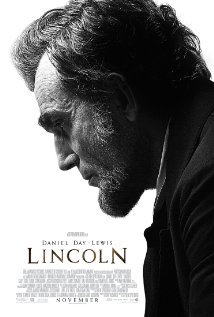
Lincoln is a smart movie in conception. Instead of trying to make a run of the mill biopic about the United States’ most famous President they focus on a short time period in 1865, an extremely important historical couple of months in the history of the United States that is somewhat outside the consciousness of the general populace.
The passing of the 13th Amendment to the U.S Constitution banned slavery in the country, essentially forever. Looking back popular history grabs onto the Emancipation Proclamation as the point where slavery ended. It simply isn’t true. Survey books given to students across the country will note that that proclamation did not really free very many slaves but they rarely go into the battle that followed to end slavery for once and all.
The passage of the amendment was no sure thing.
And this film, based on portions of Team of Rivals by Doris Kearns Goodwin, makes this quite clear. It uses this short period to define Lincoln as a man and as a politician. Daniel Day-Lewis can start writing his Oscar speech now as well. His performance, and playing a figure this iconic is no mean feat, is startlingly real. There is less focus on making him look like the man on the five dollar bill and more in him becoming Lincoln on the inside—the Lincoln who wrote some of the most inspiring political speeches in U.S. history, the Lincoln who grieved for his son, the Lincoln who had to deal with a vaguely batty wife and viciously hostile political foes.
Sally Field as Mary Todd Lincoln does more than act crazy or ill-tempered. She gives us what is behind that ill temper—a mother’s grief and fear at losing her children and a woman inveterately hostile to her husband’s political foes. Most accounts say she was a temperamental woman who didn’t forget slights or attacks on her family. She was not the politician in the family. People might not have been aware of the mean spirited investigations into household finances of the White House by the U.S House of Representatives at the time. These were largely at the insistence of men from her husband’s own party. She never forgave and Field shows this side of Lincoln in all its mean spirited glory in a scene with Tommy Lee Jones.
Jones turns in a fine performance as well as abolitionist Thaddeus Stephens. If you read accounts of Stephens’s speeches in the House or read his writing you will realize, almost immediately, that the political climate of today is positively chummy compared to the times before and during the U.S. Civil War. Jones captures the feel of the historical record and makes it tangible. His performance is one of those that actors must long for—you get to articulate the words of one of the most articulate, funny and vitriolic politicians in U.S. History. Add to that the fact he was on the right side of history in the end just adds to the part.
David Strathairn, as Secretary of State William Seward, has the unenviable role of playing a virtual "straight man," not that this is a comedy. He has to play a more reserved role than Lincoln or Stephens and so falls a bit into the background. But his work is masterful.
The film looks great as well. There is no camera trickery here. It is all straightforward shots of cramped, smoky rooms full of angry men. The film is not some grand, David Lean-like effort. There is very little that is expansive. An early representation (and the only representation) of an actual battle is a muddy, vicious fistfight—not a scene from Glory or Gettysburg. It seems real, horrible and frightening. Something director Steven Spielberg likewise achieved in Saving Private Ryan on a larger scale.
Lincoln is a film for the ages. There may be those who don’t like that it is mostly people talking. No battles, no sword fights. Lincoln never fires a canon nor beheads anyone. He tells folksy stories that befuddle and disarm the other characters. If there is a legitimate gripe it is that they did not end it on a shot of Lincoln as he heads off to the theater. The ten minutes that follow this shot are fine but unnecessary.
We all know what happened to Abraham Lincoln.





 RSS Feed
RSS Feed